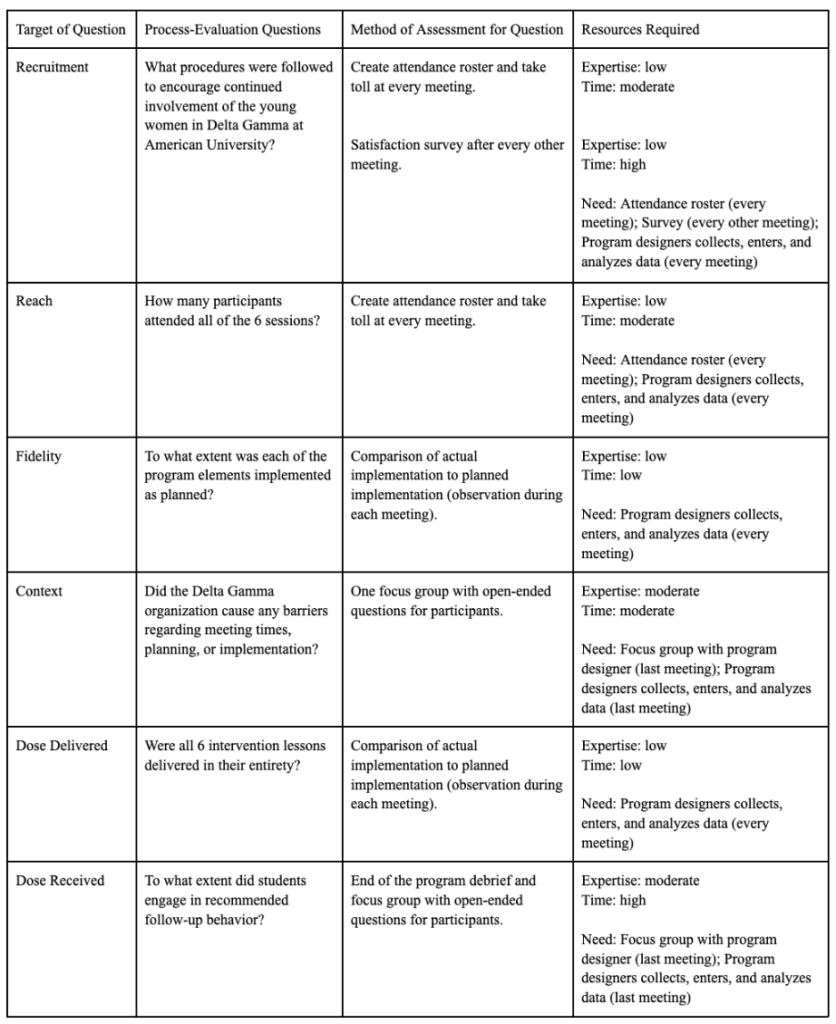Process Evaluation Plan
The ideally implemented Nutrition for You pilot program will consist of three essential components: a student safety training component, six nutrition skills-based education courses, and an Encourage Social Support website.
The Training Component
Nutrition for You students will need to obtain needed kitchen safety skills through a training session delivered by Nutrition for You program developers. Training will include a one-day session (two hours) on Sunday from 6:00 pm to 8:00 pm, prior to the start of the nutrition education component, and will be touched upon throughout the program to provide additional support as needed. To complete the nutrition skills-based education component, attendance for the kitchen safety skills training is mandatory for all participants. Most of the necessary program materials (i.e., knife, cutting board, and measuring cup) will be provided during training. Other program materials (i.e., oven, microwave, and blender) will not be provided during training. The training will be characterized by:
- Have all 20 participating students present.
- Coverage of kitchen safety content.
- Demonstration of kitchen safety.
- Involvement of students through small group discussions, demonstrations, and feedback.
The Nutrition Education Component
The Nutrition for You nutrition skills-based education courses consist of preparation and cooking skills and is designed to be delivered through an online meeting platform (i.e., Zoom, Teams, etc.) during a 6-week period. These online meetings will take place for 20 minutes every Sunday, 6:40 pm to 7:00 pm (EST), totaling 6 lessons throughout the program. The courses are designed to be highly participatory. Program designers are encouraged to engage the student participants in a manner that promotes discussions and self-efficacy. These qualities will become more vital in the latter portion of the intervention when students are required to perform recipes of their choosing.
For implementation to be considered ideal, the courses should be delivered across multiple sections of the kitchen. A likely combination might include using a knife and cutting board with a stove and oven. The course components are designed to be delivered in sequential order because the knowledge and skills taught in the second require mastering those taught in the first. The nutrition skills-based education will contain, at a minimum, the following:
- Have at least 20 participating students present per lesson.
- Program designers will deliver preparation skills in which students will participate in an in-group discussion.
- Program designers will engage students in a preparation skills activity in which they demonstrate what they have learned.
- Program designers will deliver cooking skills in which students will participate in an in-group discussion.
- Program designers will engage students in a cooking skills activity in which they demonstrate what they have learned.
- Students work in teams to come up with a recipe and individually perform a recipe of their choosing. They will then critique each other’s techniques and final recipe.
The Social Support Component
Nutrition for You students will gain information and be supported by their peers through a website created by the program developers. Once a week, a program developer will create and upload a blog post for students to discuss previous skills learned and continue to learn about preparing skills, cooking skills, healthy recipes, or meal ideas. The Encourage Social Support component will be characterized by:
- Have all participating students following the blog.
- Coverage of primary and additional content.
- Involvement of student discussions through blog posts.
Evaluation Questions
- Recruitment: What procedures were followed to encourage continued involvement of the young women in Delta Gamma at American University?
- Reach: How many participants attended all of the 6 sessions?
- Fidelity: To what extent was each of the program elements implemented as planned?
- Context: Did the Delta Gamma organization cause any barriers regarding meeting times, planning, or implementation?
- Dose Delivered: Were all 6 intervention lessons delivered in their entirety?
- Dose Received: To what extent did students engage in recommended follow-up behavior?

